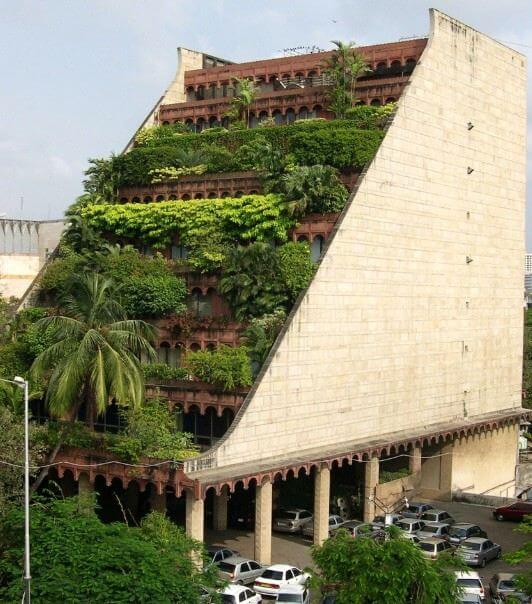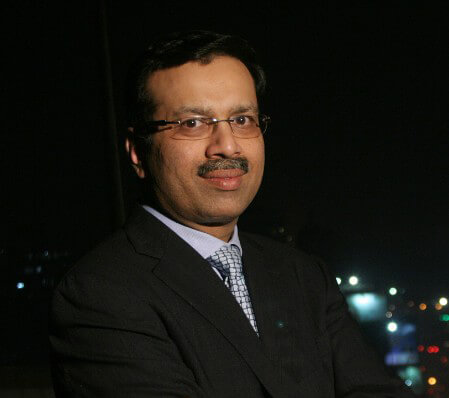Since the early 19th century the Goenka family has been passing entrepreneurial spirit and a growing business legacy from generation to generation. RP Goenka’s sons Harsh (Chairman) and Sanjiv (Vice-Chairman) have been spearheading the group’s management from 1990. Today, the Rama prasad Goenka Group employs over 50,000 employees and continues to innovate and grow alongside its rapidly evolving country.
India
The economic environment in India has witnessed a sea change in the past two decades. The liberalisation of economic policies that began in the early 90s completely transformed the way corporations were run and managed. Some of the industrial houses that flourished in the pre-liberalisation era, met with an uphill task of coping with large international giants that rushed into India. Used to a regime of licences and controls, the companies now had to now tackle issues like economies of scale and competitive pricing. Over the past 20 years, India has emerged as one of the leading economies of the world and even when the global economic recession crippled the world, India remained relatively cushioned due to rising domestic demand and a steady GDP.
Vision and Mission
The RPG group has been a witness to India’s rapidly changing environment and has managed to adjust to these changes even as it grows rapidly. RPG’s key objective is to remain one of the leading Indian business groups with a focus on market capitalisation through leadership in profitability and revenue growth in its chosen businesses. Being a customer-centric organisation and being the most exciting workplace are also two key elements of the group’s vision.
History
The history of RPG began in 1820 when Ramdutt Goenka, from a small town in Rajasthan, a state in Western India famous for its businessmen, came to Calcutta to get into business with the British East India Company. By the 1900s the Goenkas established themselves in diverse business sectors like banking, textiles, jute and tea. Sir Hariram Goenka and Sir Badridas Goenka were conferred knighthood by the British for outstanding contribution to business and the community. In 1933, Sir Badridas Goenka became the first Indian to be appointed Chairman of the Imperial Bank of India (now the State Bank of India).
Keshav Prasad Goenka (son of Sir Badridas Goenka) continued the successful history of entrepreneurship. In 1950, the Goenkas acquired two British trading houses – Duncan Brothers and Octavius Steel. After successful acquisitions in the areas of tea, automobile, tyre, jute, cotton textile and electric cables, Keshav Prasad Goenka retired in the 70s. His business was then taken over by his three sons, Rama Prasad, Jagdish Prasad and Gouri Prasad and after a few years of working together, the businesses were split between the three brothers.
Rama Prasad Goenka (better known as RP Goenka), established RPG Enterprises in 1979 with Phillips Carbon Black, Asian Cables, Agarpara Jute and Murphy India, the companies that he inherited when the family business was split. He was then very eager to grow, and now that he was on his own, he was in a position to implement his decisions faster. He quickly sold off Agarpara Jute and went about implementing an aggressive acquisition led strategy for growth. His two sons Harsh and Sanjiv were still studying at the time.

RP Goenka’s business acumen and ability to spot opportunities enabled him to acquire a fleet of companies in the 80s. The first was CEAT Tyres of India in 1981, which it bought from its Italian parent. CEAT was then the third largest tyre company after Modi Rubber and Dunlop India. The company was profitable, rich with cash reserve and real estate and had strong brand equity. Very soon Harsh returned after his business schooling at IMD, Lausanne and took over as Managing Director of CEAT Tyres of India Ltd at the young age of 24.
The group then went on to acquire KEC (1982) and Searle India, now RPG Life Sciences (1983). In 1984, Goenka picked up one of India’s blue-chip companies in alliance with a partner. While elder son Harsh was managing CEAT out of Mumbai, he wanted Sanjiv to steer a similar prized company in Kolkata. Dunlop was thus picked up in alliance with a partner. Things did not work too well in the partnership and the Group exited Dunlop well before it got mired in troubles. The Group picked up music company HMV (1988)and finally CESC, Harrisons Malayalam, Spencer & Co. and ICIM in 1989. RPG’s talent for spotting potential acquisitions and his skill of executing them seamlessly got him a legion of admirers in India’s business circles.
When the Group acquired CESC, the power utility company in Kolkata, it was poorly managed and its return and dividends were managed by the government. Today, CESC is one of the most efficient power companies and a benchmark for the industry.
The 1979 split had left Goenka with a Rs 700 million group. By 1989 these acquisitions propelled RPG Enterprises from thirteenth to fourth rank in terms of size in India. By 1992, RPG Enterprises joined the $1 billion (Rs 33 billion) club. By 1995, Group sales were Rs 45 billion.
Joint ventures have also been a preferred mode of growth at RPG Enterprises. In 1984, RPG Enterprises tied up with Tyco Electronics, USA to form a 50:50 joint venture, Raychem RPG limited. The company caters to the infrastructure industry for hi-tech products. Tyre-maker CEAT too has a joint venture company, CEAT Kelani Associated Holdings, which commands over 60 per cent of the market share in truck tyres in Sri Lanka.
Joint ventures, acquisitions and mergers have been historically the Group’s forte. It has displayed its strengths in being able to integrate companies seamlessly, thanks to its accommodative nature.
In the 90s, focussing on core businesses had replaced diversity as the buzzword. RPG Enterprises was an amalgamation of diverse companies in various sectors. With a changed economic scenario that saw many landmark changes in policies, many of the companies that flourished earlier needed a makeover. From an acquisitions-led strategy, the group’s focus then shifted to strategic planning, restructuring, and consolidation in the 90s.
In 1993, Group Chairman Harsh Goenka got in international consultants McKinsey to provide strategic direction. Subsequently, it consolidated its position in a number of businesses and exited a few. A lot of tough measures were taken and this period has shaped the Group to be what it is today.
Today
Today, RPG has more than twenty companies across eight business sectors – power, infrastructure, tyres, carbon black, IT, entertainment, retail and speciality — with a turnover of Rs. 16,000 crore ($3.6 billion). It now covers a wide range of sectors and businesses and can even be called a microcosm of Indian business itself, thanks to its vast footprint. So, from CESC in power, CEAT in tyres, KEC in infrastructure, to Harrisons Malayalam and RPG Life Sciences in speciality, the group covers an awe-inspiring range of businesses and sectors, managing them deftly despite their very different requirements.
And even though the Group has weathered tough economic and business environments and has had several successes, it has stood steadfastly by the vision and values which it holds so dear. The Group’s values of customer sovereignty, people orientation, innovation, entrepreneurship, transparency & integrity have propelled it to perform and excel.
RP Goenka’s sons Harsh (Chairman) and Sanjiv (Vice-Chairman) have been spearheading the group’s management from 1990. RP Goenka currently oversees the group’s affairs as “Chairman Emeritus”. The third generation of the RPG family is also now involved in managing the business. Harsh’s son Anant is now the deputy managing director of CEAT Ltd, one of the leading tyre manufacturers in India. However, the group ferociously protects the spirit of entrepreneurship and innovation and believes in allowing the day-to-day running of the companies to be vested with the large number of talented professional managers it has across its various companies. The daily management is therefore delegated to these managers.
With over 50,000 employees in its fold, the RPG Group is extremely focussed on its HR policies. It believes in valuing its people, empowering performance, providing diverse opportunities and rewarding performance even as going for growth remains its primary objective.
Most of the major group companies are public listed with the Group holding a substantial chunk of the equity. Power utility giant CESC is a benchmark in efficiency for the sector, tyre maker CEAT is one of the top Indian tyre makers, KEC International is the largest global EPC company in the world, tea and rubber plantations company Harrisons Malayalam is the pride of the southern state of Kerala, Phillips Carbon Black is the largest carbon black producer in India and Zensar Technologies is one of the fastest growing IT companies in the business.
Today, growth has once again become the new mantra at the RPG Group. The Group is aiming for a 20%+ growth year on year. Having weathered a severe global economic downturn successfully, most of the companies are now exploring all avenues to get on to a higher growth trajectory. “There comes a stage in the lifecycle of any company when it has to make a tectonic shift, a big leap forward. We have reached that stage now,” says Chairman Harsh Goenka. To put it simply, incremental growth alone is no longer the way forward. The group will now look at a balance of organic and inorganic growth to power its ambitions.
India apart, the Group’s footprint is spread across the world through companies like KEC, its infrastructure play which puts up projects across the world including in some of the most difficult terrains. Over half of KEC’s business is global. CEAT exports tyres to 112 countries and has marketing offices in Belgium and Dubai. It also has a hugely profitable joint venture in Sri Lanka and is the largest tyre company in that country. Phillips Carbon Black is also setting up a plant in Vietnam now, while Zensar also has a formidable global footprint and several top of the line global clients.
As an Indian business Group, RPG embodies the best of Indian business: the seamless marriage between the spirit of Indian entrepreneurship and innovation, the best of time-tested values and modernity of outlook and the passion for superior performance and aggressive growth in the interest of all stakeholders. A new, and even more exciting tomorrow, is not far away.
















